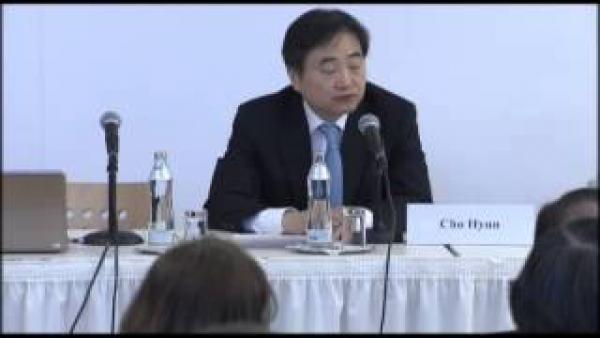10 years of The Hague Code of Conduct
Évènement
Date: January 15, 2013 from 09:15 to 16:00
Place: Diplomatic Academy of Vienna, Vienna, AT
As a part of the European Union's Strategy against the Proliferation of Weapons of Mass Destruction adopted by the EU Heads of State and Government, the European Union is committed to the non-proliferation of weapons of mass destruction and their delivery on the basis of the principles of effective multilateralism, prevention, and cooperation.
The Hague Code of Conduct (HCoC) is the result of the international community's efforts to internationally regulate the field of ballistic missiles capable of delivering weapons of mass destruction. HCoC is the only multilateral transparency and confidence-building instrument that addresses the proliferation of ballistic missiles. By subscribing to HCoC, members voluntarily commit themselves politically to provide pre-launch notifications (PLNs) on ballistic missile and space-launch vehicle launches (SLVs) and test flights. Since the signing and entry into force of the politically-binding HCoC in November 2002 in The Hague (Netherlands) the number of Subscribing States has reached 134.
The last November marked the 10th anniversary of the signing of the Hague Code of Conduct against the Proliferation of Ballistic Missiles (HCOC). In this light, the Council of the European Union adopted a formal decision in July of 2012 to continue to support its universalization and implementation (Decision 2012/423/CFSP). The Foundation for Strategic Research (FRS) is the implementing agency for this decision. In this light, a Conference to commemorate the 10 years of HCoC is organized the 15th of January 2013 at the Diplomatic Academy in Vienna. This occasion bring together ambassadors from both subscribing and non-subscribing states, as well as experts from around the world, for a half day of discussion and open debate to celebrate the 10th anniversary of the Code. This is an opportunity to discuss trends in missile proliferation, the role of the Code after 10 years and challenges for the future.
Agenda of the Event
Györgyi Martin Zanathy, Head of Delegation of the European Union to the International Organizations in Vienna
Cho Hyun, HCoC Chair, Ambassador of the Republic of Korea to the International Organizations in Vienna
Camille Grand, Director, Fondation pour la Recherche Stratégique, France
Mark Smith, Programme Director, Wilton Park, United Kingdom
Michael Elleman, Senior Fellow for Regional Security Cooperation, International Institute for Strategic Studies, Middle East, Bahrain
David Bertolotti, Deputy Director for Nuclear Disarmament and Non-Proliferation, Directorate for Security and Disarmament Strategic Affairs, MFA, France
Waheguru Pal Sidhu, Senior Fellow, Centre on Internaitonal Cooperation, New York University, NYC
Ronald Sturm, HCoC ICC, Ministry of Foreign Affairs, Austria
Gaurav Kampani, PhD Candidate, Department of Government, Cornell University, Ithaca, New York, US
Heigo Sato, Professor, Takushoku University, Japan
Bharath Gopalaswamy, Associate Director of the Program in Arms Control, Disarmament and International Security at the University of Illinois at Urbana-Champaign, US
Cho Seong-Jun, First Secretary, Permanent Mission of the Republic of Korea to the International Organizations in Vienna
Ajey Lele, Research Fellow at the Institute for Defence Studies and Analyses, New Delhi, India
Uzi Rubin, Begin-Sadat Center for Strategic Studies, Israel
Camille Grand, Director, Fondation pour la Recherche Stratégique, France
Györgyi Martin Zanathy, Head of Delegation of the European Union to the International Organizations in Vienna

10 years of The Hague Code of Conduct
Type: Study day
Date: January 15, 2013 from 09:15 to 16:00
Place: Diplomatic Academy of Vienna, Vienna, AT
Video(s)
HCoC 10th Anniversary Seminar - Opening Remarks
HCoC 10th Anniversary Seminar - Concluding Remarks

